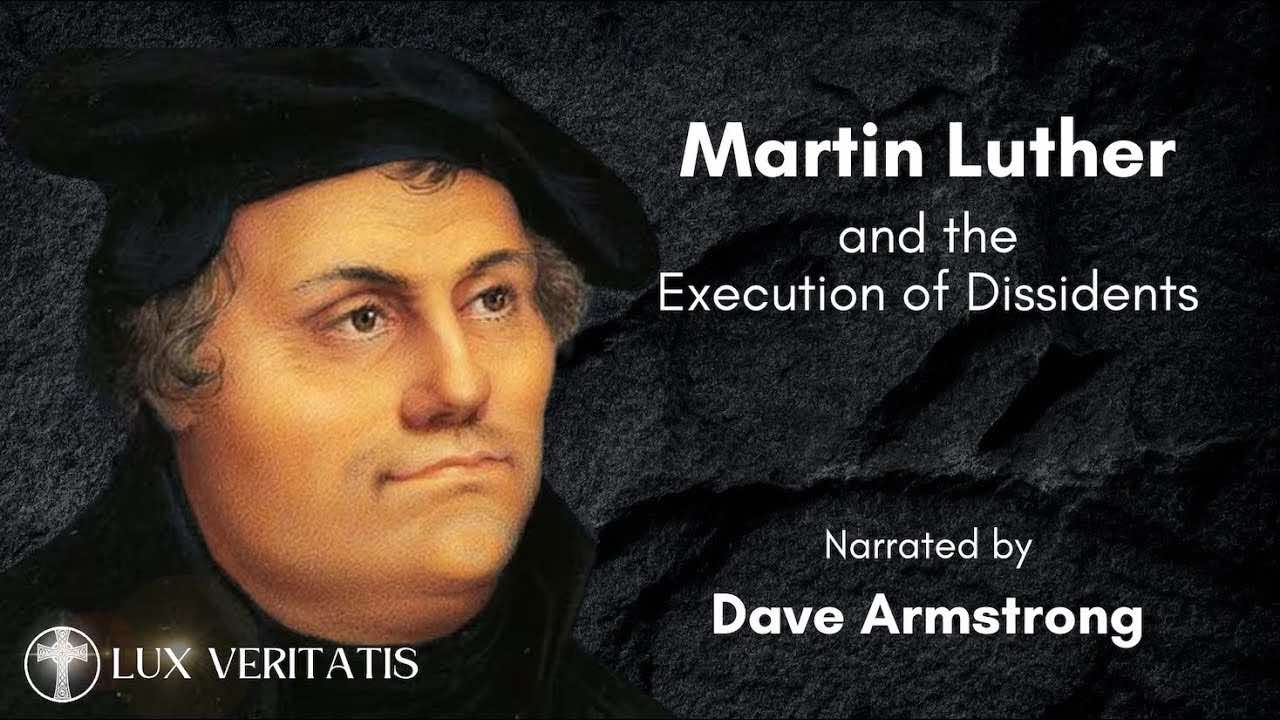Martin Luther’s words will be in green; Philip Melanchthon’s in blue.
I’ve written and spoken in videos about this many times before:
*
Philip Melanchthon: Death for Denying the Real Presence (He Later Denied the Real Presence Himself) [5-23-06]
*
*
*
*
*
*
VIDEO: Did Martin Luther Support the DEATH PENALTY for Heretics? [Lux Veritatis, 5-1-25]
*
Philip Melanchthon was Martin Luther’s best friend, associate, and successor as the leader of early Lutheranism. I ran across further related information in volume one of the two-volume set, which I have in hardcover in my own library, Toleration and the Reformation (Joseph Lecler, S.J., New York: Association Press, 1960, from the 1955 French edition; translated by T. L. Westow):
In 1530, in a letter to Myconius, Melanchthon did not hesitate to admit: ‘My opinion is that those who proclaim tenets that are frankly blasphemous, even if they are not rebels, should be done to death by the civil authority.’ [Epist. Melanchthon, lib. 5, n. 664; Corpus Reformatorum (C. R.), t. II, c. 18] Melanchthon’s case is a strange one, for this great humanist, whose conciliatory tendencies are common knowledge, was one of the most determined partisans of the death-penalty for the Anabaptists.*Although more than hesitant at first, Luther found himself carried along by his friend’s opinion. In this same year, 1530, in his exposition of Psalm 82 [83], he recalled. when speaking of the serious forms of heresy, the terrible penalties extracted by Jewish law against those who blaspheme in public. Then he went on:*But there are other heretics who dare teach matters contrary to the faith as it is clearly founded on the Scriptures and professed by all Christendom, such as the articles which children are taught in the Creed. Theses heretics presume to teach among other things that Christ is not God, but only man; that he is therefore only a prophet like any other, as the Turks and the Anabaptists maintain. Such people should not be tolerated, but punished as public blasphemers. . . . Moses lays down in his law that such blasphemers, and all false teachers, should be stoned. [Weimar Werke, t. XXXI, 1, pp. 208-209]*. . . The following year, 1531, he formally approved the document which the theologians of Wittenberg had sent to Johann Frederick, elector of Saxony, on the question: Should Anabaptists be punished by the sword? [C. R. , t. IV, cc. 737-740] Melanchthon, who had prepared it, observed first that there were certain heretics whose teaching was conducive to rebellion against the princes. They could therefore be treated as rebels:*One must . . . consider as blasphemy and sedition the fact that public preaching is condemned , , , and that the Church is rejected in every way. It is intolerable blasphemy . . . to teach that one should seek other ways of sanctification, without preaching and without a minister of the Church. This implies destruction of the Church and sedition against the clerical status. Such an attempt must be prevented and repressed like any other sedition. . . . The prince is indeed bound by the second commandment to protect and to support the public ministry, that is, the ecclesiastical status. We may therefore conclude that my gracious Lord is entitled to apply to them in good conscience the penalties laid down by the [Justinian] Code, law II (L. I, tit. 5). [C. R., t. IV, c. 739]*Melanchthon, therefore, clearly demands capital punishment, even for peaceful Anabaptists, and now Luther formally gave his placet to the document: Placet mini Martino Luthero. . . .*There still exists another contemporary document on the Anabaptists, drawn up by the Wittenberg theologians in 1536. Signed by Luther, Johann Bugenhagen, Melanchthon, and Kaspar Creutziger, it was written in reply to a question put by the Landgrave Philip of Hesse to these theologians: What should be done with the Anabaptists who had just been arrested? A few months before, several of those heretics had been executed in Jena on the advice of Melanchthon. The 1536 document bore the title: ‘Are Christian princes bound to repress the Anabaptists, an anti-Christian sect, by corporal punishment and even by the sword?’ [Werke, t. L, pp. 9 ff.] The reply is in the affirmative, even in the case of heretics whose teaching is not seditious, but only contrary to essential points of the faith:*Everyone is bound to prevent and repress blasphemy according to his status and function. By virtue of this commandment princes and civil authorities have the power and the duty to abolish unlawful cults, and to establish orthodox teaching and worship. The same commandment teaches them, moreover, to repress the public teaching of false doctrines and to punish the obdurate. Concerning this point the text of Leviticus applies (24:16): ‘he that blasphemeth the name of the Lord, dying let him die.’ [Werke, t. L, p. 12] . . .
Princes must not only protect the goods and material existence of their subjects, but their most essential function is to promote the honour of God, to repress their blasphemy and idolatry. That is why in the Old Testament the kings and not only the Jewish kings, but also kings converted from paganism, had the false prophets , together with the idolaters, put to death. Such examples apply to the function of princes, as St. Paul also teaches: ‘The law is good, for the chastisement of the blasphemers’ [cf. 1 Tim. 1:8-9]. . . . It is clear that the public authority is bound to repress blasphemy, false doctrine and heresy, and to inflict corporal punishment on those that support such things. [Werke, t. L, p. 13] [Lecler, Vol. 1, 161-163]
*
***
*
Practical Matters: I run the most comprehensive “one-stop” Catholic apologetics site: rated #1 for Christian sites by leading AI tool, ChatGPT — endorsed by popular Protestant blogger Adrian Warnock. Perhaps some of my 5,000+ free online articles or fifty-six books have helped you (by God’s grace) to decide to become a Catholic or to return to the Catholic Church, or better understand some doctrines and why we believe them. If you believe my full-time apostolate is worth supporting, please seriously consider a much-needed monthly or one-time financial contribution. “The laborer is worthy of his wages” (1 Tim 5:18, NKJV).
*
PayPal donations are the easiest: just send to my email address: [email protected]. Here’s also a second page to get to PayPal. You’ll see the term “Catholic Used Book Service”, which is my old side-business. To learn about the different methods of contributing (including Zelle and 100% tax-deductible donations if desired), see my page: About Catholic Apologist Dave Armstrong / Donation Information.
*
You can support my work a great deal in non-financial ways, if you prefer; by subscribing to, commenting on, liking, and sharing videos from my two YouTube channels, Catholic Bible Highlights and Lux Veritatis (featuring documentaries), where I partner with Kenny Burchard (see my own videos and documentaries), and/or by signing up to receive notice for new articles on this blog. Just type your email address on the sidebar to the right (scroll down quite a bit), where you see, “Sign Me Up!” Thanks a million!
*
***
*
Photo Credit: copyright Lux Veritatis, 2025.
*
Summary: Martin Luther, the founder of Protestantism, and his successor, Philip Melanchthon, & other early Lutheran leaders, advocated the death penalty for even peaceful Anabaptists.














